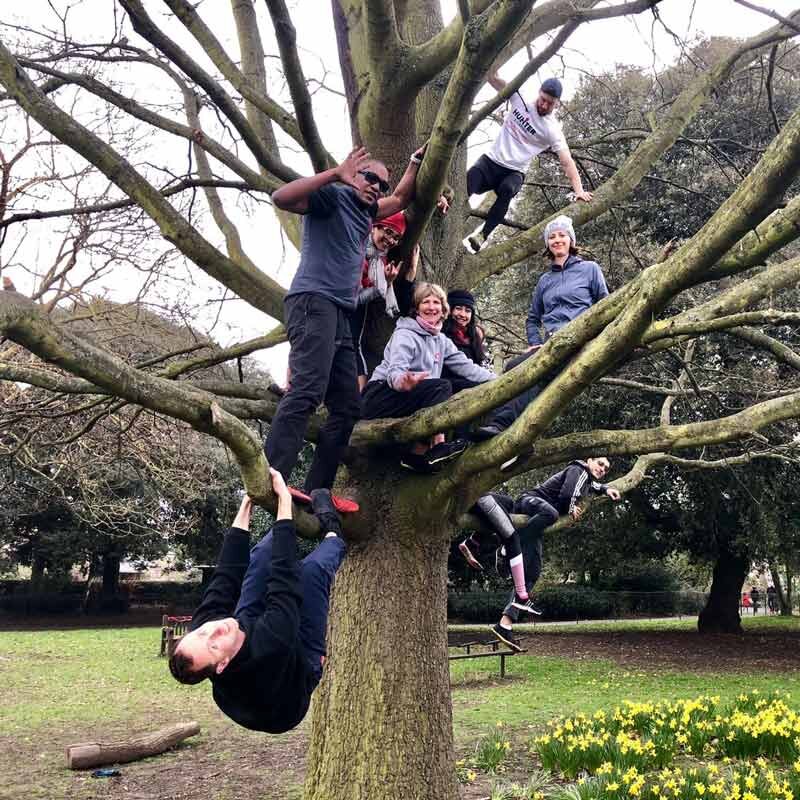What are the benefits of climbing trees?
Climbing technically starts as early as a baby can pull themselves up to stand. As close cousins to other primates, it makes sense that humans are often drawn to climbing. It is one of the first movement patterns we engage in as babies— even before walking— and once we get the hang of it as toddlers, we are scaling anything and everything!
Great for kidults too!
Your early ancestors likely lived in a world filled with trees, and climbing these natural structures would have been far more common than it is today. No matter your age, climbing trees can be a fun way to enjoy a great playout, and this activity is available free of charge—but what exactly can this activity of arboreal locomotion do for you? Let's take a look!
1. Increases Natural Strength
Many people go straight to lifting weights and using machines when they want to build their strength. While methods like this can be effective, they are not always fun or functional, and they don't always target the muscle groups used for natural movement.
Climbing trees is different. You will improve your strength using your body weight while performing natural movements that will work a wide range of your muscles. Your arms, back, shoulders, core, and legs (actually your entire body) will all be able to be pushed when you climb a tree.
2. Improves Balance & Confidence
Being confident is a significant part of life, but many people struggle to push themselves to do things that make them feel uncomfortable. Climbing trees can be a great way to build your confidence and help you take on challenges in your daily life. Instead of focusing on what other people may think, you can become more playful and concentrate on what brings you joy.
Gain confidence and overcome obstacles as you climb.
Alongside this, it will also come with the added benefit of increasing your balance, coordination and understanding of body mechanics. This will make it easier for you to perform other activities while also giving you the confidence to use your body to its fullest.
3. Great Fun For All Ages
Young kids have long enjoyed climbing trees, although things have changed drastically in the past couple of decades. In reality, children are more likely to injure themselves by falling out of bed than out of a tree!
RELATED: Watch Darryl Edwards' TED TalkTree climbing is even less common amongst adults, but I experience it a few times a year. Taking on a challenge like this can be very fun, though, which makes it an excellent activity for people of all ages.
Getting up there with the kids!
Of course, there is some level of risk that comes with climbing trees. This makes it worth spending the time to teach your children to do it safely, though, and it can help if you climb trees yourself.
4. Develop A Love Of Nature
With more and more people living in cities in the modern world, many humans are primarily disconnected from nature. Many people believe that mother nature has nothing much to offer compared to the delights of 21st-century tech, but spending time in the great outdoors can be an excellent way to remedy nature deprivation and sedentary behaviour.
Climbing a tree will give you the chance to encounter a range of habitats, will provide you with great views, and will allow you to use the natural world to improve your own body. In other words, to make the great outdoors your playground. Fitness doesn't have to be boring; nature can do the hard work for you.
5. All your senses come alive
You will see the world from a totally different perspective than usual. You gain different experiences through touch with differing smooth and rough textures of the tree. As the wind whistles through the leaves you’ll hear interesting sounds and become more aware of the smells around you.
What About The Science?
There are numerous proven benefits to engaging with trees and nature.
Studies have found that exposure to phytoncides — naturally produced compounds found in trees — can lower blood pressure, relieve stress and boost immune function.[1]
In another study, comparing subjects climbing both trees and human-made structures found that the tree climbers showed "less stress, greater vitality and reduced tension, confusion and fatigue." [2]
Research also suggests that time in nature positively affects mood and aspects of cognitive function, including working memory and reduced anxiety. [3]
RELATED: Checklist for Daily MovementA Few Tips on Tree Climbing
Ready to give tree climbing a go? Ask yourself these questions:
Do I feel capable of doing so?
[Don't let my ego get in the way. Start small, stay safe].Am I permitted to climb this tree?
[Some parks have laws against tree climbing].Is the tree safe to climb?
[Check for dead wood]Are the tree's branches big enough to support my bodyweight?
Can I descend as safely as I can climb the tree?
[It's always more challenging to climb down in reverse].Can I climb barefoot or wear minimalist shoes for a better grip?
With all of this in mind, you should be feeling ready to start climbing. It's always worth taking safety precautions before deciding to scale a tree, but there are plenty of trees around that can help you take this challenge on with minimal risk. Here are some locations in London, England, that allow tree climbing for kids.
It will all be worth it to improve your movement capability while having great fun at the same time.
RELATED: See some tree climbing in actionRELATED POSTS:
References:
[1] Li, Q et al., "Effect of phytoncide from trees on human natural killer cell function.", International journal of immunopathology and pharmacology vol. 22,4 (2009): 951-9. doi:10.1177/039463200902200410
[2] Gathright, John & Yamada, Yozo & Morita, Miyako. (2006)., "Comparison of the physiological and psychological benefits of tree and tower climbing.", Urban Forestry & Urban Greening. 5. 141-149. 10.1016/j.ufug.2005.12.003.
[3] Bratman, G.N., Daily, G.C., Levy, B.J. and Gross, J.J. (2015). The benefits of nature experience: Improved affect and cognition. Landscape and Urban Planning, [online] 138, pp.41–50. Available at: https://www.sciencedirect.com/science/article/pii/S0169204615000286 [Accessed 1 May 2019].
Go Climb A Tree!













